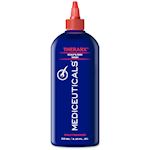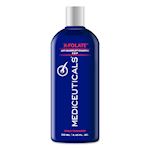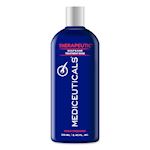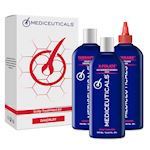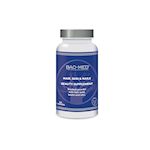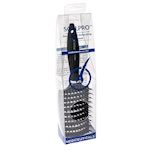-
DANDRUFF: WHAT IS IT AND HOW TO GET RID OF IT?
Are there yellowish, greasy flakes in your hair or on your scalp? Then there is a good chance that you suffer from dandruff. Of the people who suffer from scalp problems, dandruff, also called hair dandruff, is the most common form. Dandruff is characterized by yellowish, greasy flakes on the scalp and is not contagious. Also, it has nothing to do with your personal hygiene. It is uncomfortable.
Many people experience dandruff as an annoying problem because it causes a lot of dandruff to get stuck in the hair and on the scalp. In addition, with dandruff, you also suffer from an itchy scalp, which causes a lot of irritation. And then it is also important to scratch as little as possible when dealing with dandruff, in order to prevent inflammation of the scalp.
-
WHAT IS DANDRUFF?
With dandruff, you suffer from yellowish, greasy flakes on the scalp. At least half of people sometimes suffer from dandruff. If you suffer from it once, there is a good chance that you will suffer from it again. Many people confuse dandruff on the scalp with dry scalp. Yet there are clear differences.
With dandruff, the flakes are often more yellowish and tend to stick to the scalp. The flakes are less likely to come off. With a dry scalp, the flakes are white in color, very fine and loose. If you run your hand through your hair with a dry scalp, the flakes will easily fall onto your clothes.
WHAT CAUSES DANDRUFF?
In people who suffer from dandruff, the scalp cells renew too quickly. With a healthy scalp, the skin continuously renews itself. The skin cells divide and multiply, forming a new layer of skin. The old cells die and detach. The resulting flakes are not visible to the naked eye.
In people with dandruff, the skin cells divide twice as fast. These cells stick together and then form flakes that are visible. Just like with psoriasis, this causes too many skin flakes to flake off at the same time. With dandruff, this does not cause a build-up or inflammation as with psoriasis, but it does cause more flakes that are visible in the hair and on the scalp.
Dandruff is often seen as a mild form of seborrheic dermatitis. The cause of dandruff is the same as that of seborrheic dermatitis. The only difference is that dandruff is milder because the complaints are less severe. A yeast-like fungus (Malassezia also called Pityrosporon Ovale) also causes flaking of the scalp in dandruff. With dandruff due to seborrheic eczema, you often also see flakes of skin in, for example, the eyebrows.
WHAT CAN AGGRAVATE THE SYMPTONS OF DANDRUFF?
There are a number of factors that appear to play a role in aggravating the symptoms of dandruff:
Stress
Stress is not a direct cause of dandruff, but it can make dandruff worse. Stress causes you to produce more of the hormones testosterone and cortisol. These influence sebum production. In addition, stress also affects the immune system. This can cause the condition of your scalp to become unbalanced, giving yeast-like fungi more opportunity to grow.
The lack of important nutrients
Unhealthy eating is the cause of a lot of misery. But did you know it can also make dandruff worse? Eating too much sugar and carbohydrates causes the hormone insulin to spike. Such a peak in turn causes an overproduction of sebum, possibly resulting in dandruff.
Sensitivity to certain care products
The care products you use to wash and style your hair may also play a role in dandruff. There are products that can cause or worsen dandruff. Dandruff can be caused by using a shampoo that is too aggressive. Hard water with a lot of lime and aggressive styling products may also contribute to the development of dandruff. Therefore, always be careful with care products that contain irritating substances.
Washing your hair too little
The frequency of hair washing is quite precise. Washing your hair less than 2 to 3 times a week is often not enough. Hair follicles can become clogged by sebum, dead skin cells and styling products. This can irritate your scalp and cause it to flake and itch.
WHAT TO DO ABOUT DANDRUFF AND A ITCHY SCALP?
There are various products available to treat dandruff. Some products are aimed at combating yeasts and others at inhibiting inflammation of the skin and therefore itching. The product that people use most is an anti-dandruff shampoo. At Mediceuticals we have X-Folate shampoo in our range, that treats dandruff. When treating dandruff, it is important to massage the shampoo thoroughly over the entire scalp and then let it sit for 2 to 3 minutes. This allows the active ingredients in the shampoo to loosen the flakes and reduce the inflammation of the scalp.
In addition to using a shampoo, it is also important to neutralize the acidity (pH value) of the scalp with a conditioner suitable for the scalp, such as our Therapeutic conditioner. Apply the cooling Therapeutic conditioner to the scalp and hair. Allow the product to work for 2 to 3 minutes and then rinse thoroughly with lukewarm water.
It is recommended to use a Dandruff Kit to treat stubborn dandruff. In addition to our X-Folate shampoo and Therapeutic conditioner, you will also find the Therarx scalp & skin wash. Before washing, distribute this product over your entire (dry) scalp or just the areas where the dandruff is prevalent. Let this work for 1 to 2 minutes. Do not wash the Therarx out, rather dampen the hair with water and immediately apply the X-Folate shampoo and let it work for 2 to 3 minutes. After rinsing out the shampoo, complete the treatment with the Therapeutic conditioner, which you also leave on for 2 to 3 minutes before rinsing it out with lukewarm water.
NO MORE DANDRUFF
Many people suffer from dandruff once, but often several times in their lives. The origin of dandruff is clear, but an exact cause is usually difficult to determine. Fortunately, dandruff is easy to treat. With a shampoo, conditioner and possibly a pre-treatment, the dandruff will disappear. And with that, the annoying itching that comes with it will also disappear.
Remember that your scalp needs time to recover. And give the hair care products a helping hand by eating healthy and avoiding stress. In the future, be careful with aggressive hair products that damage your scalp. Then you will enjoy a healthy scalp without dandruff for longer.
-
DO YOU WANT MORE INFORMATION ABOUT MEDICEUTICALS?
For personal advice you can contact us or make an appointment at one of our certified Mediceuticals salons.




